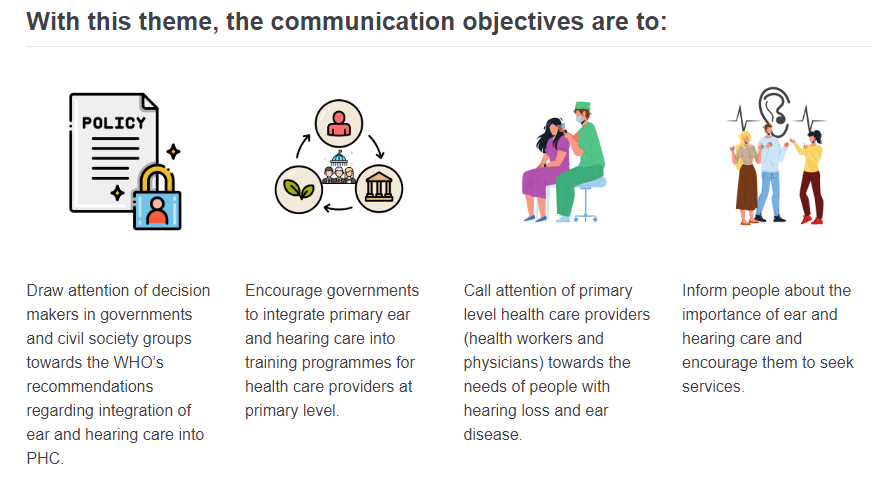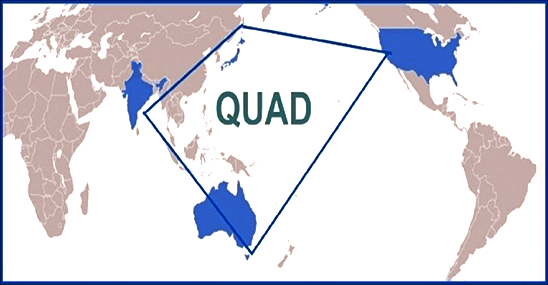Rapid Fire
Rapid Fire Current Affairs
- 04 Mar 2023
- 6 min read
World Hearing Day
World Hearing Day is celebrated on the 3rd of March each year to raise awareness on how to prevent deafness and hearing loss and promote ear and hearing care across the world.
Each year, the World Health Organization (WHO) determines the theme. The theme of this year is “Ear and hearing care for all”.
Normal hearing range is from 0 dBHL (Decibel Hearing Level), which is the audiometric zero, to 20 dBHL. A person who is not able to hear as well as someone with normal hearing – hearing thresholds of 20 dB or better in both ears is said to have hearing loss. Hard of hearing refers to people with hearing loss ranging from mild to severe. Deaf' people mostly have profound hearing loss, which- implies very little or no hearing.
Read More: First World Report on Hearing: WHO
Quad Meeting
During the recent meeting of Quad members in New Delhi, the Foreign Ministers of the Quad countries called for lasting peace in Ukraine and, in an indirect reference to the Russian invasion, underlined respect for territorial sovereignty and integrity. They also addressed China's aggressive behavior in the Indo-Pacific and its attempts to block the UN designation of terrorists.
It was decided to form a Quad Working Group on Counter-Terrorism and to engage more closely with the Indian Ocean Rim Association (IORA), a grouping of 23 members that include India and Australia.
Quad is the grouping of four democracies –India, Australia, the US, and Japan. All four nations find a common ground of being democratic nations and also support the common interest of unhindered maritime trade and security. It aims to ensure and support a “free, open and prosperous” Indo-Pacific region. The idea of Quad was first mooted by Japanese Prime Minister Shinzo Abe in 2007. In 2017, India, Australia, the US and Japan, came together and formed this “quadrilateral” coalition.
The next Quad Leaders’ Summit will be hosted by Australia in 2023.
Read More: Issues and Opportunities related to Quad, Russia-Ukraine Conflict
Humayun & Other Great Mughals
Humayun (1530-1540, 1555-1556), the son of Babur and the second Mughal emperor, is best known for the tomb dedicated to him in Delhi (Humayun’s Tomb). He is one of the six great Mughals (Babur, Akbar, Jahangir, Shah Jahan, and Aurangzeb).
Humayun is chiefly remembered as a political and military failure because he lost back to his rival, the Afghan Sher Shah, whom Babur had conquered in India, and had to seek refuge in Iran and fight in Afghanistan to regain his throne in Delhi.
Babur was the founder of the dynasty, Akbar the inclusive king, and Jahangir, although overshadowed by both his father and his son, is remembered as an emperor in whose reign peace, prosperity, and the arts flourished.
Shah Jahan was the master builder who gave India its most recognised monument, the Taj Mahal. Under Aurangzeb, the empire expanded to its farthest boundaries.
Read More: Indo-Islamic Architecture
Dhara Initiative
The unique and flagship initiative “Dhara: Ode to Indian Knowledge Systems”, taken up under the aegis of Azadi Ka Amrit Mahotsav by the Ministry of Culture has completed one year in February 2023. The Indian Knowledge Systems (IKS) Division of the Ministry of Education located at AICTE, New Delhi is the key execution partner for Dhara events.
During its yearlong activities, it has been successful in creating public awareness and stakeholder participation and helped to devise a framework for the promotion and revival of multiple domains of IKS. The programme was conceptualized as a series of lectures and discussions dedicated to specific areas of inquiry highlighting India’s civilizational achievements.
Azadi Ka Amrit Mahotsav is an initiative of the Government of India to celebrate and commemorate 75 years of progressive India and the glorious history of its people, culture and achievements. After a prolonged struggle spread over more than 100 years on the back of several movements spearheaded by individuals and communities across the country, India successfully ousted the foreign rulers from the Indian subcontinent in 1947.
Read More: Initiatives on 75th Independence Day






